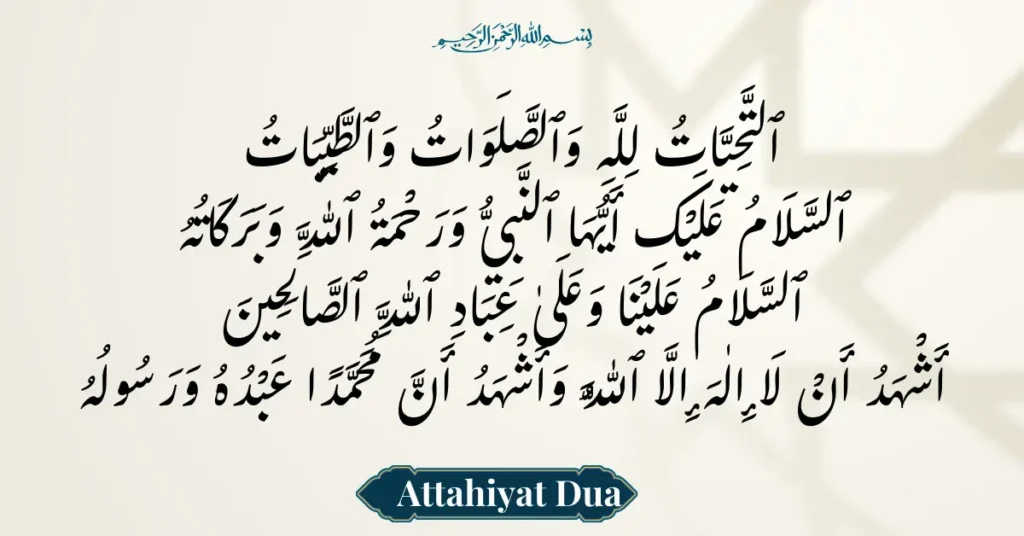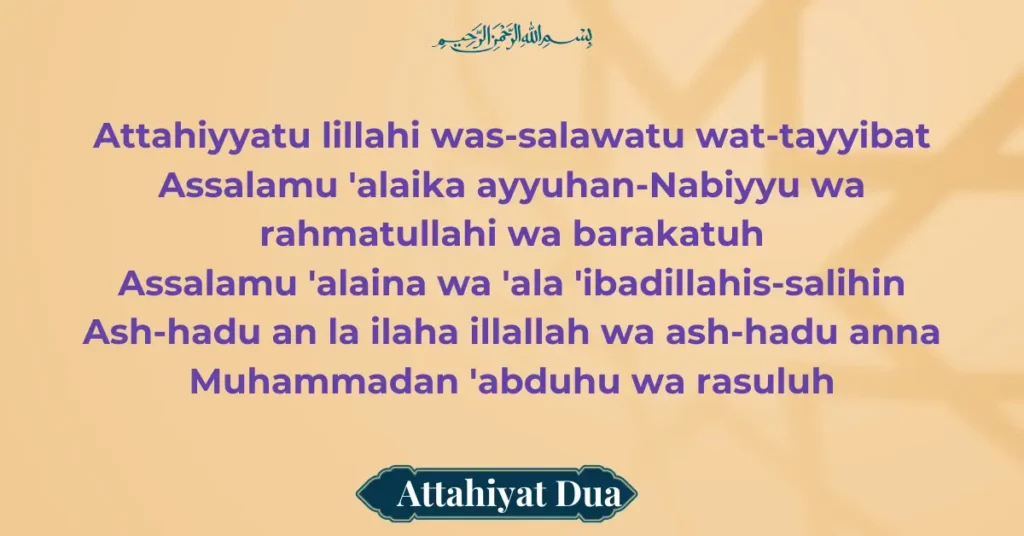
Attahiyat in Prayer: A Complete Guide with Translations and Meanings
رہنمائی فہرست Guidance Index
Assalamu alaikum! Today, I want to share with you something we say in our everyday namaz – the Attahiyat and Durood Ibrahim. Many of us have been reciting these beautiful words since childhood, but do we know their deep meaning and importance? Let’s understand them together in simple words.
What is Attahiyat?
Attahiyat comes from the Arabic word “tahiyyah” which means greetings or salutations. In Hindi, many of us know it as “तश्हुद” (Tashahhud). It’s like a special conversation we have with Allah during our namaz.
Remember when you were little and your Abbu or Ammi taught you how to greet elders with “Assalamu alaikum”? Attahiyat is similar – it’s our way of greeting Allah, but with words taught by Prophet Muhammad ﷺ himself.
The Complete Text of Attahiyat with Meanings

Let’s break down the Attahiyat into small parts so it’s easy to understand:
First Part:
Arabic: التَّحِيَّاتُ لِلَّهِ وَالصَّلَوَاتُ وَالطَّيِّبَاتُ
Transliteration: “At-tahiyyatu lillahi was-salawatu wat-tayyibatu”
Hindi: “अत्तहिय्यातु लिल्लाहि वस्सलवातु वत्तय्यिबातु”
Meaning: All greetings, prayers, and pure words are for Allah alone
Second Part:
Arabic: السَّلاَمُ عَلَيْكَ أَيُّهَا النَّبِيُّ وَرَحْمَةُ اللهِ وَبَرَكَاتُهُ
Transliteration: “Assalaamu ‘alaika ayyuhan-Nabiyyu wa rahmatullahi wa barakaatuh”
Hindi: “अस्सलामु अलैका अय्युहन्नबिय्यु व रहमतुल्लाहि व बरकातुह”
Meaning: Peace be upon you, O Prophet, and Allah’s mercy and blessings
Third Part:
Arabic: السَّلاَمُ عَلَيْنَا وَعَلَى عِبَادِ اللهِ الصَّالِحِينَ
Transliteration: “Assalaamu ‘alainaa wa ‘alaa ‘ibaadillaahis-saaliheen”
Hindi: “अस्सलामु अलैना व अला इबादिल्लाहिस्सालिहीन”
Meaning: Peace be upon us and upon all of Allah’s righteous servants
Fourth Part:
Arabic: أَشْهَدُ أَنْ لاَ إِلَهَ إِلاَّ اللهُ وَأَشْهَدُ أَنَّ مُحَمَّدًا عَبْدُهُ وَرَسُولُهُ
Transliteration: “Ash-hadu an laa ilaaha illallah, wa ash-hadu anna Muhammadan ‘abduhu wa Rasooluh”
Hindi: “अश्हदु अल्ला इलाहा इल्लल्लाह, व अश्हदु अन्ना मुहम्मदन् अब्दुहू व रसूलुह”
Meaning: I bear witness that there is no god except Allah, and I bear witness that Muhammad is His servant and messenger

Listen to Attahiyat Audio
What is Durood Ibrahim?
After Attahiyat, we recite Durood Ibrahim. This is what you shared:
Arabic: اللَّهُمَّ صَلِّ عَلَى مُحَمَّدٍ وَعَلَى آلِ مُحَمَّدٍ كَمَا صَلَّيْتَ عَلَى إِبْرَاهِيمَ وَعَلَى آلِ إِبْرَاهِيمَ إِنَّكَ حَمِيدٌ مَجِيدٌ
اللَّهُمَّ بَارِكْ عَلَى مُحَمَّدٍ وَعَلَى آلِ مُحَمَّدٍ كَمَا بَارَكْتَ عَلَى إِبْرَاهِيمَ وَعَلَى آلِ إِبْرَاهِيمَ إِنَّكَ حَمِيدٌ مَجِيدٌ
Transliteration: “Allaahumma salli ‘alaa Muhammadinw wa ‘alaa ‘aali Muhammad; kamaa sallayta ‘alaa ‘Ibraaheema wa ‘alaa ‘aali ‘Ibraaheem, ‘innaka Hameedum Majeed.
Allaahumma baarik ‘alaa Muhammadinw wa ‘alaa ‘aali Muhammad; kamaa baarakta ‘alaa ‘Ibraaheema wa ‘alaa ‘aali ‘Ibraaheem, ‘innaka Hameedum Majeed.”
Hindi: “अल्लाहुम्मा सल्लि अला मुहम्मदिन्व व अला आलि मुहम्मद, कमा सल्लैता अला इब्राहीमा व अला आलि इब्राहीम, इन्नका हमीदुम् मजीद
अल्लाहुम्मा बारिक अला मुहम्मदिन्व व अला आलि मुहम्मद, कमा बारक्ता अला इब्राहीमा व अला आलि इब्राहीम, इन्नका हमीदुम् मजीद”
Meaning: O Allah, send Your prayers upon Muhammad and the family of Muhammad, just as You sent prayers upon Ibrahim and the family of Ibrahim. Truly, You are Worthy of Praise, Full of Glory.
O Allah, send Your blessings upon Muhammad and the family of Muhammad, just as You sent blessings upon Ibrahim and the family of Ibrahim. Truly, You are Worthy of Praise, Full of Glory.
Listen to Durood Ibrahim Audio
When Do We Recite Attahiyat and Durood?
In our daily namaz, we recite Attahiyat twice:
First Attahiyat (Qaida Ula):
- In 2-rakat namaz: At the end before salaam.
- In 3-rakat namaz: After two rakats.
- In 4-rakat namaz: After two rakats.
Last Attahiyat (Qaida Akhira):
- At the very end of namaz before salaam.
After Attahiyat, we recite Durood Ibrahim. Think of it like this – first we greet Allah (Attahiyat), then we send our love to our Prophet ﷺ (Durood).
How to Sit During Attahiyat
The sitting position during Attahiyat is called “Qa’dah.” Here’s how to do it:
For First Attahiyat:
- Sit on your left foot.
- Keep right foot upright with toes pointing towards Qibla.
- Place hands on your thighs.
- Point your index finger during shahada.
For Last Attahiyat:
- Sit on the ground.
- Put left foot under right leg.
- Keep right foot upright.
- Position same as first Attahiyat.
Important Tips for Perfect Attahiyat
Pronunciation Tips:
- Take your time with each word.
- Don’t rush through it.
- Pay special attention to long and short vowels.
Common Mistakes to Avoid:
- Don’t move your finger continuously.
- Don’t rock back and forth while sitting.
- Don’t look around during recitation.
Things to Remember:
- Focus on the meaning while reciting.
- Keep your gaze on your lap.
- Maintain proper sitting position.
Benefits of Attahiyat and Durood
Spiritual Benefits:
- Connects us directly with Allah.
- Helps us follow Prophet’s ﷺ teachings.
- Brings peace to our hearts.
Physical Benefits:
- The sitting position improves posture.
- Deep breathing during recitation calms the mind.
- Regular practice helps in concentration.
How to Teach Attahiyat to Children
Break it Down:
- Start with small portions.
- Use rhythm to make it memorable.
- Practice regularly.
Make it Fun:
- Use hand gestures for different parts.
- Create simple stories about the meanings.
- Reward progress with encouragement.
Frequently Asked Questions
Q: Is Attahiyat mandatory in prayer?
A: Yes, it’s a necessary part of namaz. Missing it intentionally requires repeating the prayer.
Q: What if I make a mistake in Attahiyat?
A: If you realize during prayer, do Sajda Sahw (prostration of forgetfulness) at the end.
Q: Should I recite it fast or slow?
A: Always recite at a moderate pace with proper pronunciation.
Q: Can I recite only Attahiyat without Durood?
A: In the final sitting, both Attahiyat and Durood are necessary.
Conclusion
Remember, friends, every word we say in namaz has beautiful meaning and purpose. When we understand what we’re saying, our prayer becomes more meaningful. Start by learning one small part at a time. Soon, you’ll find yourself reciting with both your tongue and heart.
Sources:
- Sahih al-Bukhari 831, 832.
- Sahih Muslim 402.
- Sunan Abu Dawood 968.
- Sahih al-Bukhari 3370 (for Durood Ibrahim).
- Sahih Muslim 405.
May Allah help us perfect our prayers and accept them from us. Ameen.



